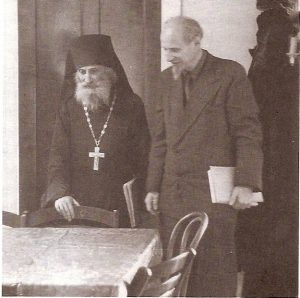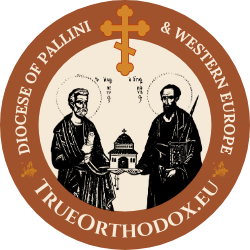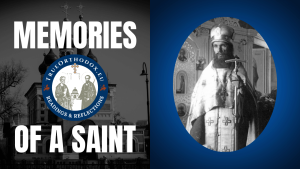Orthodoxy and Heterodoxy

Archimandrite Constantine Ziatsev with Prof. Ivan M. Andreyev, 1959

Before the Face of Antichrist
Archimandrite Konstantin
Orthodox Life March 1970
That the world is leaving Christ and that it is united in this movement, embracing with it even all that was included in Christendom in all its manifestations, including Orthodoxy, which has remained successively the original Church of Christ, is already, to a degree, becoming accessible to the understanding of Christian man, And this is already calling forth certain actions of self defense on the part of those who want to remain with Christ. Something of what is done in this line, more or less by chance, becomes known to the general public. But the consciousness of the unity which disregards all the bonds which, until the present “ecumenical” period of the history of the Church, were accepted as being absolutely impassable, and in this, especially in regard to faithfulness to Christ, however subjectively it might be understood — such a consciousness has by no means yet defined itself.
Christ once spoke perfectly clearly about the character of a similar unity. Before us stand two statements of two completely different hues of meaning. He that is not with me is against me; and he that gathereth not with me scattereth abroad [Matt. 12:30]. This is the first: he who does not manifest active solidarity with Christ is not only not Christ’s but is a force already inimical to Christ. But in as much as He speaks about the disciples following Him, the Lord gave a completely different explanation when they told him that they had forbidden a man who did not associate with them to cast out demons in the name of Christ. Forbid him not; for there is no man which shall do a miracle in my name, that can lightly speak evil of me. For he that is not against us is on our part [Mark :38-40]. This is the second statement, according to which service to Christ is by no means limited formally; it can be accepted by Christ in any form — by grace adopted and clothed by Him in His power, to one degree or another. Both these sayings of the Lord cannot but have a permanent significance and, perhaps, it is now that they must be revealed in full measure — at a time when, although in a reverse direction, an atmosphere akin to early Christianity arises.
Those who are not actively united with the true Christ — those, by the force of things, turn out to be against Him. This is manifest today with an astounding clarity which takes on an ever-increasing mass character. But as for the forms of communion with Christ, they are losing more and more their character of formal successiveness. Communion with Christ, in an entirely new and ever growing force, is capable of being born anew, on any soil! And thus there is formed a mass phenomenon, characteristic of the end of the world, which will be met by the most decisive counteraction on the part of the Antichrist — a counteraction so disastrous that, as the Lord Himself told us, He will be prepared to hasten His coming in order to intercept this destruction.
This phenomenon which will decisively define itself only in the time of the Antichrist, nonetheless can be noted in our times in the natural, mutual attraction to one another of those who want to remain with Christ. Thus there appears a certain contrasting analogy to the ecumenism of Antichrist — in the spiritual kinship of all the appearances of faithfulness to Christ, wherever they be found, even if in the manifestation of heterodoxy, if there arises a reaction against the ecumenism of Antichrist in the form of a defense of minimal bit of the genuine Christ that remains in that ecclesiastical body, then this cannot but arouse sympathy from all the “faithful” regardless of the degree to which they are “Orthodox”. And here, of course, is not excluded any formulation of such a unity in faithfulness to Christ. Moreover, if this unity embraces all the “faithful,” regardless of the fullness of their faithfulness, then does there not quite naturally arise a striving for the general possession of the fullness of Truth?
And here one saying of Christ attracts special attention, a saying which until the present time remained unrevealed in its concrete content. So often we hear the following words of the Savior in church: I am the door; by me if any man enter in he shall be saved, and shall go in and out and find pasture … I am the good shepherd… I am the good shepherd and know my sheep and am known of mine.. And other sheep I have, which are not of this fold: them also I must bring, and they shall hear my voice; and there shall be one fold, and one shepherd [John 10:9-16].
Is the meaning of that which is proclaimed in these words revealed in what must naturally arise at the present time, under the conditions of the epidemic regeneration in the direction of Antichrist of all church “denominations”, even Orthodoxy? All those, each in their own denomination who courageously remain with Christ, thus separate themselves from their own denomination, which as a whole, is joining Antichrist. And is not their mutual drawing together, generated into a general preparedness to rise to the level of the fullness of Orthodoxy? And in this, does there not seem to be realized just what Christ spoke of as the one fold which will arise, uniting around the one Shepherd?
Thus there appear two conflicting processes which cannot but develop more and more clearly in the process of the unfolding of apostasy: on the one hand, the appearance within all Christian denominations of a certain kernel of “faithful” who are prepared to endure all in their faithfulness to their denomination in its original from, not corrupted by the influence of Antichrist, and at the same time the appearance, completely natural, with the drawing together in the name of faithfulness to Christ, of a sympathetic interest in the content of the faith of all the denominations thus drawn together, an interest which will extend just as naturally to the realization of the alienation of all heterodox denominations from the fullness of Christianity, which is present only in Orthodoxy.
Thus two new phenomena appear in the atmosphere of the thickening apostasy: mutual, sympathetic interest and inclination to rapprochement from all sides in all Christian denominations as far as faithfulness to the true Christ is concerned, and at the same time, as a result of mutual trust in the atmosphere of faithfulness to the true Christ on the part of all denominations which have left the original fullness of Christianity, a mutual inclination to acquire this fullness.
To define the Orthodox point of view more precisely in this process of thickening apostasy, it can be said that all, in the eyes of Orthodoxy, are her own, if only they manifest a faithfulness to even that little bit of genuine Christianity which they receive in their denomination. But, on the part of Orthodoxy, more than ever before, a missionary effort must be directed to these heterodox in the name of forming, before the face of Antichrist, one fold following one Shepherd.








